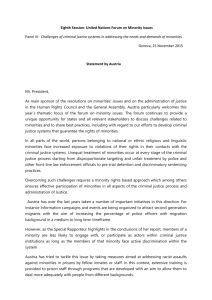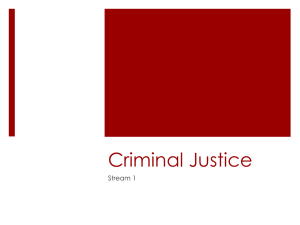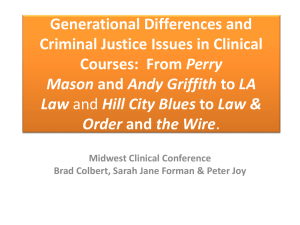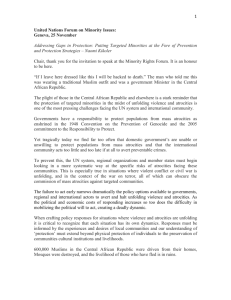Chairperson of the Forum on Minority Issues_Mr_Joshua Castellino
advertisement
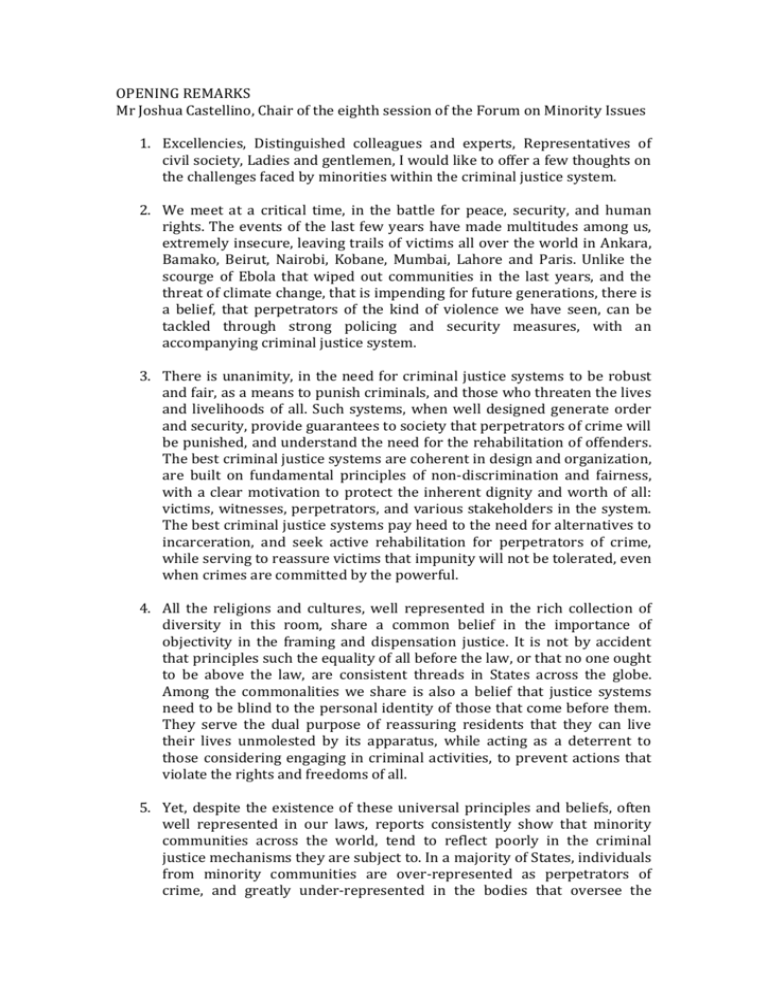
OPENING REMARKS Mr Joshua Castellino, Chair of the eighth session of the Forum on Minority Issues 1. Excellencies, Distinguished colleagues and experts, Representatives of civil society, Ladies and gentlemen, I would like to offer a few thoughts on the challenges faced by minorities within the criminal justice system. 2. We meet at a critical time, in the battle for peace, security, and human rights. The events of the last few years have made multitudes among us, extremely insecure, leaving trails of victims all over the world in Ankara, Bamako, Beirut, Nairobi, Kobane, Mumbai, Lahore and Paris. Unlike the scourge of Ebola that wiped out communities in the last years, and the threat of climate change, that is impending for future generations, there is a belief, that perpetrators of the kind of violence we have seen, can be tackled through strong policing and security measures, with an accompanying criminal justice system. 3. There is unanimity, in the need for criminal justice systems to be robust and fair, as a means to punish criminals, and those who threaten the lives and livelihoods of all. Such systems, when well designed generate order and security, provide guarantees to society that perpetrators of crime will be punished, and understand the need for the rehabilitation of offenders. The best criminal justice systems are coherent in design and organization, are built on fundamental principles of non-discrimination and fairness, with a clear motivation to protect the inherent dignity and worth of all: victims, witnesses, perpetrators, and various stakeholders in the system. The best criminal justice systems pay heed to the need for alternatives to incarceration, and seek active rehabilitation for perpetrators of crime, while serving to reassure victims that impunity will not be tolerated, even when crimes are committed by the powerful. 4. All the religions and cultures, well represented in the rich collection of diversity in this room, share a common belief in the importance of objectivity in the framing and dispensation justice. It is not by accident that principles such the equality of all before the law, or that no one ought to be above the law, are consistent threads in States across the globe. Among the commonalities we share is also a belief that justice systems need to be blind to the personal identity of those that come before them. They serve the dual purpose of reassuring residents that they can live their lives unmolested by its apparatus, while acting as a deterrent to those considering engaging in criminal activities, to prevent actions that violate the rights and freedoms of all. 5. Yet, despite the existence of these universal principles and beliefs, often well represented in our laws, reports consistently show that minority communities across the world, tend to reflect poorly in the criminal justice mechanisms they are subject to. In a majority of States, individuals from minority communities are over-represented as perpetrators of crime, and greatly under-represented in the bodies that oversee the criminal justice system. As a consequence, even with the best will in the world, many minorities regard criminal justice systems with fear: as outside their existence, but within their experience. In turn criminal justice systems and people working within them, often view minorities as posing a series of problems that need to be addressed. 6. At a time of heightened security concerns, this state of affairs is dangerous for a number of reasons. First, it institutionalizes social exclusion, heightening fear and suspicion, generating deep structural schisms in the body politic. Such schisms can then be easily be exploited by those who seek to undermine State security and the enjoyment of human rights by all. Second, in this climate of fear and suspicion there is a real prospect that minorities will be viewed by the security apparatus as a threat, raising the specter of collective punishment against vulnerable groups. Such collective punishments would, in turn, silence moderate voices within societal debates, favouring more strident ones. 7. In such security environs, it is important to acknowledge that fear begets increased fear, with suspicion acting as oxygen to fan such flames. We need to come together to adopt the strong view that terrorism has no religion and no country. It relies instead on an ideology of fear, and its adherents perpetrate violence to cover their inherent cowardice in seeking systemic change for the many injustices that exist. Mahatma Gandhi once warned us about dangers of retaliation: how an eye for an eye would only make the whole world blind. We see such blindness in our lifetime, often accompanied by a collective strategic myopia in designing fairer more inclusive societies. 8. At times like this the easiest response for insecurity is to blame the Other. To hold a mirror to the Other, accuse them of being terrorists, accuse them of being criminals. Yet the scourge that we are dealing with is an internal one, arising from within our community: the human community undivided by our ethnic, religious and linguistics differences. Terrorists over time have come in various disguises: it is the act that needs elimination, irrespective of the identity it hides itself in. 9. I trust that these two days will enable us to hear about creative ways in which criminal justice system can, and are being reformed, to make then better serve the interests of creating ordered, more inclusive, and fairer societies. I particularly welcome the opportunity to understand the extent to which these systems can become truly representative of the populations they seeks to operate within. We must commit to leaving here in two days with a set of concrete recommendations fully cognizant of where the problems lie, that are pragmatic enough to generate creative responses, and determined enough to implement these in the face of the many inevitable obstacles that will arise in achieving these goals. 10. In the last year we have seen significant police violence, often targeted at minorities. These events, when they occur, undermine faith in the criminal justice system in itself. They creates a deficit of trust and confidence which impacts the way in which minorities behave towards the police, and the extent to which the police, feeling under siege, respond. Eradicating violence from policing ought to be a general consideration, but perhaps more pragmatically, ensuring that where it is absolutely necessary, it is used in proportionality to the exigency of the situation, is fundamental. 11. Of course effective policing and penitentiary systems would focus as much on building trust and confidence within societies and preventing crime, as they do on seeking out perpetrators who ought to be punished by the system. To do this effectively, such bodies need to be truly representative of the population they seek to police. It is not only important to attract and recruit candidates from minority backgrounds, especially women. It is, rather, equally important to ensure that they are retained, are visible in society, and harbor genuine prospects for promotion all the way to the status of decision makers. Such processes would, over time, eliminate harmful attitudes and practices that may be prevalent within institutions, but would also send out a clear message to the public that the function of policing is not one that can be done primarily from and by dominant communities. 12. An equally specific branch of the state’s administration I would hope we would pay special attention to in our deliberation over the next two days, is the composition and attitudes of our judiciary. It is a fundamental norm of all good legal systems that the justice mechanisms we have in place are viewed as independent and objective. This creates legal certainty and removes doubt about the extent to which bias informs decisions. Ensuring that the judiciary is cognizant of the lived experiences of all within their society, is a basic requirement in dispensing an adequate standard of justice. But a much bigger challenge lies in ensuring that our judiciaries represent people from the entire spectrum of its nationals with a particular emphasis on women, minorities, and especially, minority women. This is not only important in terms of visibility: it is, rather a fundamental necessity for the pathos and empathy that characterize good judicial decision making. 13. With these remarks I would now like to take the opportunity to draw your attention so some important points and ground rules to ensure that these two days provide us with genuine opportunity for dialogue that has characterized these fora.
